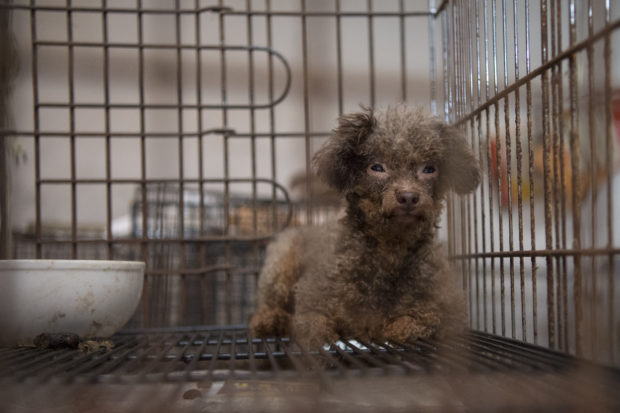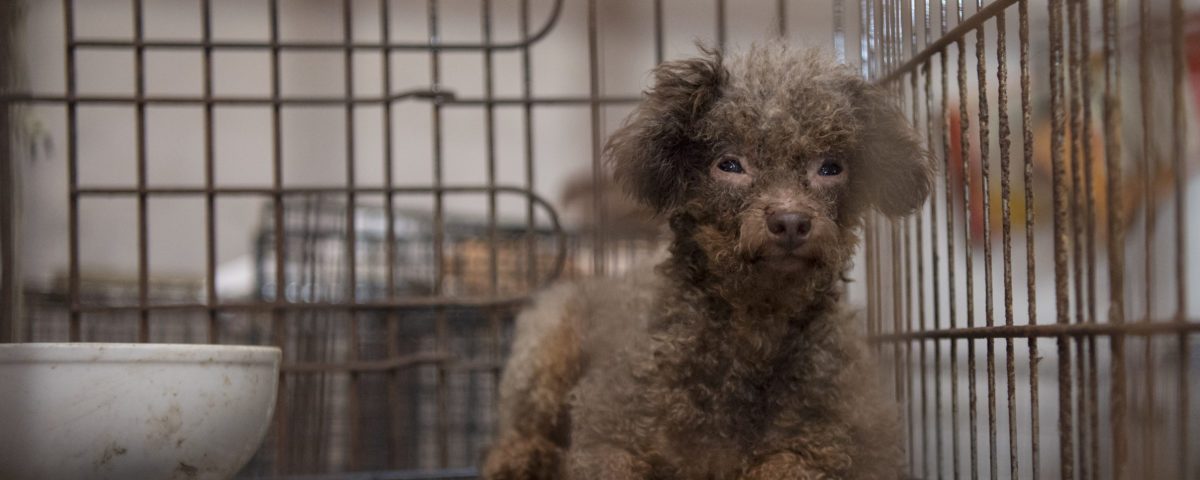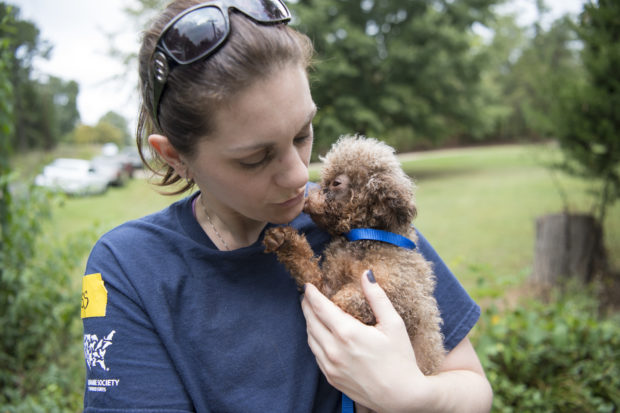Of the entire dizzying array of animal cruelty concerns, there’s not one more top of mind for the American public than puppy mills. It’s a term we’ve all been hearing for decades and we’ve lamented the presence of the industry for at least as long. Yet, amazingly, there’s still so much confusion about puppy mills, and there’s been very little in-depth reporting about the state of the industry.
That changes today with Paul Solotaroff’s remarkable feature in this month’s Rolling Stone magazine entitled “The Dog Factory: Inside the Sickening World of Puppy Mills.”

For his article Rolling Stone reporter Paul Solotaroff piggybacked on a puppy mill raid that the HSUS Animal Rescue Team carried out with the Cabarrus County Sheriff’s Office in North Carolina. Above, a dog in a crate at the puppy mill. Photo by Meredith Lee/The HSUS
This is Solotaroff’s second deep dive into animal issues; he first took on the efforts by agribusiness interests to pass ag-gag measures and to wall off America’s factory farms and slaughter plants from inquiring minds.
What Solotaroff learned in his original reporting was that ag-gag measures might even apply to puppy mills. That led him to his second investigative report, where he decided to take a first-hand look into the puppy mill business. He piggybacked on a raid that the HSUS Animal Rescue Team carried out with the Cabarrus County Sheriff’s Office in North Carolina.
As with all puppy mill rescues, the sight that greeted our Animal Rescue Team inside the puppy mill was appalling. “It was pitch-black inside, and the smell was a hammer,” wrote Solotaroff, in describing the house where the dogs were confined. “Here were the parent dogs in desperate shape: blinded by cataracts and corneal ulcers, their jaws gone or missing entirely after their teeth had rotted away. Some were so feeble, they couldn’t stand erect; their paws were urine-scalded and their wrists were deformed from squatting on wire their entire lives.”
Solotaroff saw our rescue team carry 105 dogs to safety from filthy, dark wire cages surrounded by cobwebs and trash. Altogether, we delivered 150 animals from this hell-hole, including numerous cats, kittens, and goats. For anyone who sees this kind of menace first-hand, it forever changes your perceptions. It was perhaps our 25th raid in recent years just in North Carolina.
Astonishingly, the North Carolina legislature – despite having an immense volume of photographic and video evidence, and testimonials from law enforcement personnel from rural counties throughout the state about the severity and scale of the problem – hasn’t taken action to root out the industry. In fact, it’s done nothing. North Carolina remains deregulated when it comes to puppy mills, and that’s why interventions wait until the living conditions are so bad for the animals that the average puppy mill morphs into an animal cruelty crime scene. Only then, when there is an active case of cruelty and neglect, can we work with law enforcement to pull animals from life-threatening, life-denying, and accursed conditions.
Solotaroff wrote not just about the plight of the dogs, but also about the burden placed on law enforcement and animal welfare groups who get saddled with the costs of picking up the pieces. Photo by Meredith Lee/The HSUS
My colleague John Goodwin, who directs our puppy mills campaign, also took Solotaroff to a dog auction – this one in Missouri. The auction was held inside a hangar-size warehouse, and one by one 300 dogs were placed on a table on a dais and sold. Two auctioneers “called out bids while touting the dogs’ untapped value,” Solortaroff wrote. “She’s a 2012 model and showin’ a belly; she’ll work hard for you!”
This is what is extraordinary about this piece of journalism: the piece touches each vertebra in the spine of this grisly trade, from the puppy mill breeders and the auctioneers to state and federal regulators and other enforcement agencies who have so little to work with, because the agribusiness lobby and the puppy mill trade have teamed up to thwart progress in so many ways. In North Carolina, the hog industry fights rules to crack down on puppy mills. And, shockingly and shamefully, the American Kennel Club, which is headquartered in North Carolina, has also joined the opponents of legal reform to crack down on mills. Hard to believe. But indisputably true.
Solotaroff wrote not just about the plight of the dogs, but also about the burden placed on law enforcement and animal welfare groups who get saddled with the costs of picking up the pieces. “The HSUS expects to spend at least $100,000 on the raid – most of it for medical care – which is actually on the low side,” he observed. Indeed, we spend millions caring for animals who never should have been placed in this kind of misery. Agribusiness groups and the AKC stand in the way, but then we pay the bills.
Solotaroff also wrote about the deficiencies at the U.S. Department of Agriculture, and the very rare circumstances when the agency shuts down a mill. As Solotaroff found in his research, Randy Stoen of Dows, Iowa, received a slap on the wrist from the USDA even though he shot one of his dogs and repeatedly threatened inspectors. What does it take to shut down a mill if those aren’t disqualifying actions? Steve Kruse of Stonehenge Kennel, another Iowa-based, USDA-licensed breeder, received only a 21-day suspension for throwing a bag of dead puppies at a USDA inspector. Both men appeared on our 2016 Horrible Hundred report due to their terrible mistreatment of dogs, yet they remain federally licensed to this day. Solotaroff’s story will help us pressure the USDA to shut down more puppy mills like Stoen’s and Kruse’s.
Online sellers pose an especially insidious threat, because they are an easy way for breeders to sell puppies. As Solotaroff writes, online dog sales is “the perfect crime. Courts don’t care about out-of-state victims, and the feds don’t even fine breeders, much less arrest them, for selling sick pups on bogus sites. Any amateur can do this out of his or her basement and make good, steady money for years.” Nevertheless, The HSUS has had some success bringing lawsuits against irresponsible and deceptive actors in this industry. HSUS attorneys are currently assisting with litigation against PuppyFind.com, an online puppy marketplace supporting many irresponsible breeders.
I hope you’ll share this piece with other people of conscience. It’s time to engage the animal-loving American public at a new and deeper level on this problem. There’s no excuse for more delays, inaction, and obstructionism. And it will be up to the incoming Trump Administration and Congress to address America’s dirty little secret of puppy mills. We can start a renewed campaign against the mills by making sure that Solotaroff’s work is widely read.
The post Rolling Stone crushes puppy mill trade appeared first on A Humane Nation.
Enviroshop is maintained by dedicated NetSys Interactive Inc. owners & employees who generously contribute their time to maintenance & editing, web design, custom programming, & website hosting for Enviroshop.

